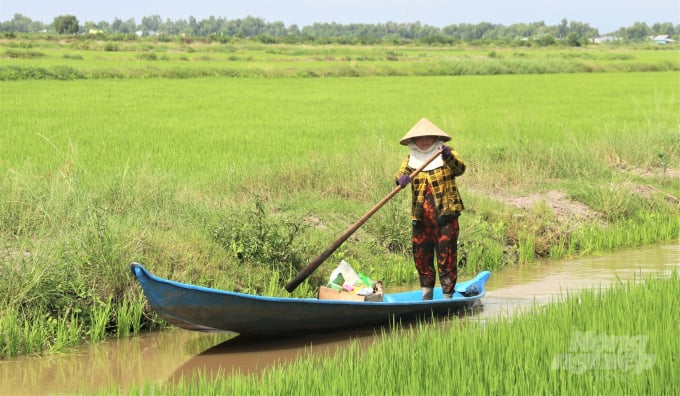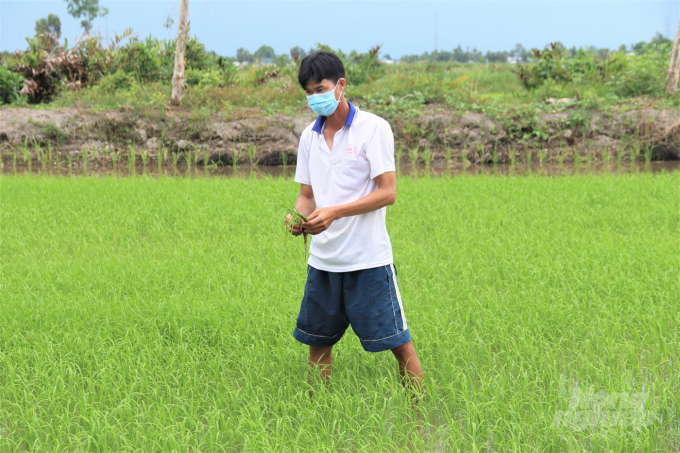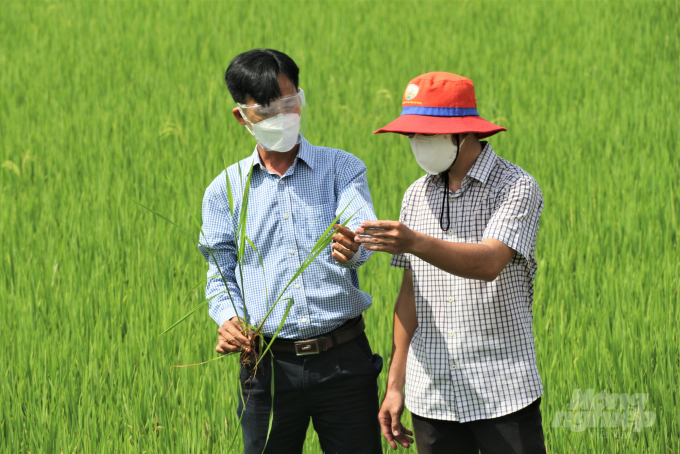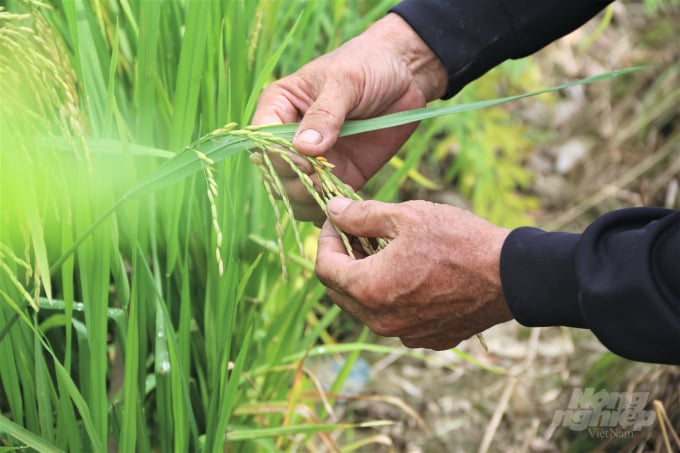June 14, 2025 | 03:33 GMT +7
June 14, 2025 | 03:33 GMT +7
Hotline: 0913.378.918
June 14, 2025 | 03:33 GMT +7
Hotline: 0913.378.918

Climate change is having far reaching impacts on agricultural production in the Mekong Delta. Photo: Pham Hieu.
According to a report of the Food and Agriculture Organization (FAO), the Mekong Delta known as the rice basket of Vietnam has been severely impacted by climate change. Changing climate in general and El Nino in particular has caused heavy losses in both agricultural production and life in the Central region, the Central Highlands and the Mekong Delta.
In a bid to reduce the impacts of climate change on rice production under the current circumstances and to develop strategies for rice cultivation in the future, Cuu Long (Mekong) Delta Rice Research Institute has been researching and developing new rice varieties that can adapt to climate change better, particularly in the areas affected by drought and saltwater intrusion.
Talking to Vietnamese Agricultural News, Doctor Mai Nguyet Lan, Deputy Head of the Department of Science and International Cooperation under the Mekong Delta Rice Research Institute said: "Through testing, we saw that the rice varieties we developed could withstand saltwater and produce high yields. We are researching to improve degraded rice cultivars and at the same time developing new varieties with better resistance to pests and diseases."

Mekong Delta Rice Research Institute has been researching and developing climate-resilient rice varieties. Photo: Pham Hieu.
Nguyen Phuong Hung, Director of Bac Lieu Agriculture-Aquaculture Seed Breeding Center, said to add value to rice and to adapt to climate change towards sustainable development, the center has developed rice cultivars with outstanding characteristics in terms of productivity and quality. More importantly these varieties must withstand local climate.
Bac Lieu Agriculture-Aquaculture Seed Breeding Center has so far developed a wide range of rice varieties like BLR103, BLR105, BLR203, BLR312, BLR413, BLR404 with the ability to adapt to different ecological regions such as rice -growing areas, shrimp-farming areas and producing high yields.
Several rice cultivars such as BLR103 and BLR105 that can tolerate salty water especially at flowering and grain filling stages. The varieties are suitable for growing in the rice-shrimp farming areas in Gia Lai town, Phuoc Long district or Hong Dan district of Dong Thap.
Apart from introducing climate-resilient rice varieties to cultivation, farmers in the Mekong Delta are focusing on spilling over organic rice farming models across the region.

Farmers in Mekong Delta are interested in organic rice growing. Photo: Pham Hieu.
According to Vo Xuan Tan, Director of Hau Giang Agricultural Extension Center, local farmers are very excited to adopt the model of growing organic rice in response to climate change. Reducing the use of chemical fertilizers and pesticides ensures not only good health for farmers but also the safety of agricultural products for consumers.
"In recent years, we have carried out many programs on training, transferring science and technology and making the model of organic rice growing popular for local farmers in response to climate change. The model is now working," said Vo Xuan Tan.
Tan Long Cooperative (in Vinh Tuong commune, Vi Thuy district, Hau Giang province) is one of the typical association adopting organic rice growing to respond to climate change. The cooperative has switched to organic farming since 2018, a move towards sustainable development which is both good for farmers' health and good for consumers as well.
Nguyen Van Thich, Deputy Director of Tan Long Cooperative, said the cooperative has 81 members growing rice, mainly ST24 and ST25 varieties on 138 hectares of land to meet market demand.

With organic farming, both the quality of agricultural products and farmers' incomes are improved. Photo: Pham Hieu.
"We control all input materials to make sure that they are all biological products. We pay more attention to the quality instead of the quantity as before. By that way, we improve our members' incomes. Previously, 1 hectare of land generated a profit of VND30million per crop. Now the profit has increased to VND60-70 million per crop. Vi Thuy Rice is now rated as the 4-star OCOP product and is certificated with VietGAP," Nguyen Van Thich said excitedly.
Raising biopesticides use to 30%
According to Hoang Trung, Director of the Plant Protection Department (PPP) under the Ministry of Agriculture and Rural Development (the MARD), in the current list of pesticides, biopesticides account for 20%. Around 15,000-20,000 tons of biopesticides are now used for pest control. The PPP made a detailed plan to promote the use of biopesticides and include this type of pesticides in the local agricultural extension services. Additionally, the PPP is also coordinating with the agencies under the MARD and localities to develop the incentive policies striving to reach 30% of biopesticides used.
Translated by Mai Tham

(VAN) In Tien Giang, a high-tech shrimp farm has developed a distinctive energy-saving farming model that has yielded promising results.
![Turning wind and rain into action: [3] 300.000 farmers benefit from agro-climatic bulletins](https://t.ex-cdn.com/nongnghiepmoitruong.vn/608w/files/news/2025/06/12/e5a48259d6a262fc3bb3-nongnghiep-125122.jpg)
(VAN) The agro-climatic bulletin has become a valuable tool for farmers in the Mekong Delta. After more than five years of implementation, the initiative is gradually being expanded nationwide.
![Turning wind and rain into action: [2] Providing forecasts to the people](https://t.ex-cdn.com/nongnghiepmoitruong.vn/608w/files/news/2025/06/12/e5a48259d6a262fc3bb3-nongnghiep-103927.jpg)
(VAN) In addition to improving the quality of hydrometeorological forecasts, putting forecast bulletins into practical use is crucial for production and disaster prevention.

(VAN) Blue carbon is receiving attention for its rapid absorption capacity and vast potential. It represents a promising nature-based solution to respond to climate change.
/2025/06/11/3507-1-161904_583.jpg)
(VAN) Seagrass beds and coral reefs serve as 'cradles' that nurture life in the ocean depths, creating rich aquatic resources in Vietnamese waters.
![Turning wind and rain into action: [1] Forecasting for farmers](https://t.ex-cdn.com/nongnghiepmoitruong.vn/608w/files/news/2025/06/11/e5a48259d6a262fc3bb3-nongnghiep-111919.jpg)
(VAN) Weather is no longer just a matter of fate. Forecasts have now become an essential companion for farmers in every crop season.
/2025/06/10/2501-3-082025_983.jpg)
(VAN) Mr. Le Hoang Minh, Head of Vinamilk's Net Zero project, recently shared insights on the integration of production, energy, and technology in Vinamilk’s green transition journey.